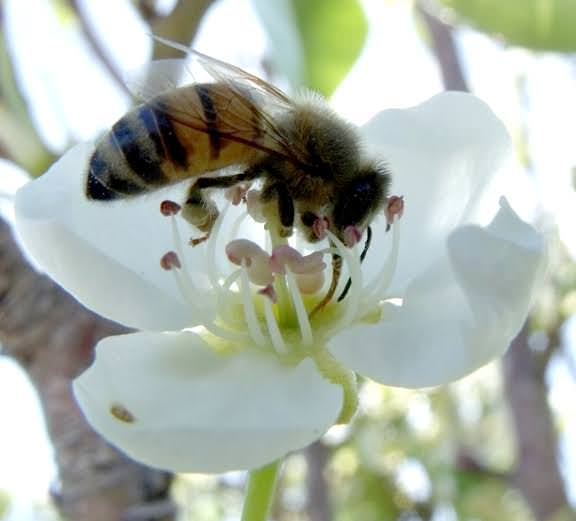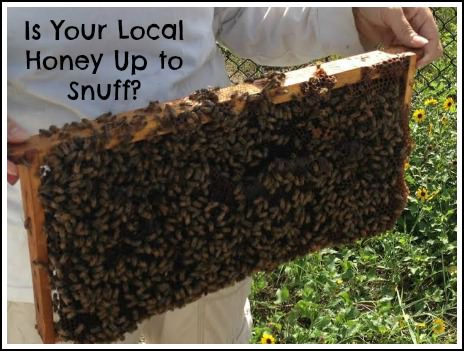Table of Contents[Hide][Show]
 The benefits of raw, local honey are widely known, especially for boosting of the immune system and keeping allergies at bay, but is the local honey you are eating providing these full benefits?
The benefits of raw, local honey are widely known, especially for boosting of the immune system and keeping allergies at bay, but is the local honey you are eating providing these full benefits?
Traditionally bees were kept in a completely natural, nontoxic manner, but this began to change as recently as 1987.
This was when the varroa mite arrived in the United States. The varroa mite lives on bees like a tick, it weakens them and can infest a hive to the point where it dies. For some beekeepers, avoiding infestation started them on a downward slide of chemical use inside bee hives.
At first, this may not seem to make sense – chemicals to kill insects put inside a box full of honeybees, which are of course, insects themselves!
However, beekeepers were losing hives and they were scared.
The first mite-killing pesticide beekeepers tried worked wonders but, as often happens, the effectiveness didn’t last long and more chemicals came along. Over the past couple of decades, keeping mites at bay with whatever chemical concoctions are working at the moment seems to have changed the culture of beekeeping to the point where many beekeepers now use chemicals and other treatments extensively in their hive management.
Here are some management techniques and practices used by most big commercial beekeepers and, surprisingly, many small beekeepers too:
- Pesticides in their hives to kill varroa mites, small hive beetles, and wax moths.
- Antibiotics in their hives, often as a preventive.
- Plastic foundation for the bees to build comb on, rather than beeswax and wood.
- Placing hives on conventional farms for pollination of crops.
- Feeding a pollen substitute which is GMO soy and powdered sugar – this is to increase the hives population at unnatural times in the season so they will be ready for pollination.
- Feeding sugar water or GMO corn syrup — also to artificially increase bee populations for pollination or because they took too much honey and the bees need extra food – if they are not careful this will end up in the honey and, just like for us, this cannot be healthy food for the bees.
Prior to keeping bees, I did not know that it was common for beekeepers to manage their hives with the techniques above. Now I know that it is extremely common, even among my small scale beekeeper friends.
I have chosen not to do this and use no treatments in my hives.
Do my hives survive?
Yes!
I do experience some loss but no more than other local beekeepers who use chemical treatments, antibiotics and/or GMO pollen substitutes. It is possible to raise bees naturally, and there is a small, but hopefully growing, movement of treatment-free beekeepers. By carefully sourcing your honey you can support and encourage this movement.
How to Source the Best Local Honey Possible
So, how can you source the best local honey?
 Know your beekeeper!! There is no substitute for this step in finding the healthiest local honey possible.
Know your beekeeper!! There is no substitute for this step in finding the healthiest local honey possible.
Where do you find a beekeeper? That can be a treasure hunt.
One place is to check your local farmers market. Often, however, you will find a retailer there who buys local honey from beekeepers wholesale and bottles it to resell so be sure to ask if they are beekeepers and selling only their own honey.
Another place will be through your local beekeeping association; these generally have websites and monthly meetings. Go to a meeting and ask around, find the one with hives closest to your home and then ask them some questions about how they keep their bees.
Important Questions to ask a Bee Keeper
- Where are your bees located? (The closer to your home the better.)
- Do you put bees on pollination?
- Do you feed your bees sugar or pollen substitute?
- How do you treat for varroa mites?
- Do you use antibiotics preemptively? Have you had to use them?
- Do you treat for small hive beetles or wax moths? How?
- What kind of foundation do you use? (Options are: plastic, wax, or none)
- Do you heat honey to bottle it? How do you filter your honey?
- Does your creamed honey (if available) contain any additives or GMOs or has it been heated during processing?
- Do your bees have access to the pollen of GMO crops? Alfalfa honey is one popular variety with this potential.
Which Local Honey to Buy?
The absolute best local honey would come from YOU keeping bees in your own backyard. With advice and support from your local beekeeping association it isn’t much harder than growing a garden, at least where I live in Florida; actually it takes less time and space.
Bees in your yard will visit flowers within an 80 square mile area (5 mile radius) around your home; they are intricately connected to the environment and benefit your local ecosystem.
The next best is local honey directly from a beekeeper in your area who uses no chemicals or other treatments, does not feed or move their bees, does not filter or heat their honey, uses wooden frames and natural wax foundation and has bee hives within 5 miles of your home. If you can’t find all that aim for meeting at least some of these criteria.
You have to weigh this for yourself. If you have a neighbor with bees but they use some treatments, that honey might be best for you because those bees are harvesting from your environment rather than honey from a completely treatment-free beekeeper an hour or two away.
I love bees and I know they can thrive without treatments. If you are actively promoting your health through nutrient dense foods and using honey as medicine it is important to know this information about how honey is produced. You can carefully source your honey just as you do other precious foods or, better yet, raise your own!
References
IPM 6 The Arsenal: Our Choice of Chemical Weapons
The Practical Beekeeper, Beekeeping Naturally by Michael Bush
Food Safety News: Tests Show Most Store Honey Isn’t Honey
Caution In The Use of Chemicals, Drugs, and Antibiotics (in bee hives)








I’m looking for local honey to help with the symptoms from my allergies. Can you tell me where I can find it? I live in the Eastern part of Cincinnati Ohio
Looking for a local organic raw honey in Peabody, Middleton in Massachusetts area. No chemicals no sugar added.
Any local raw honey growers in my area, North Durham NC in Treyburn? I would love to purchase some.
Where can I buy raw honey from farm around near Joplin Missouri, Gelena Kansas area for my brother he had cancer lung and done removed one lung and he still need raw honey real bad!!
Any beekeepers close to me? I love in Canton, Mi.
I’m searching for no chemicals added no sugar added, just pure honey.
Very informative. Live in clarkston, mi. Where can I find a honest bee keeper to purchase organic raw honey.
Looking for raw honey in the Central Illinois area. Does anyone have any for sale?
Hi I live in San Jose ,ca do you know where I can find raw honey bee? Natural unfiltered